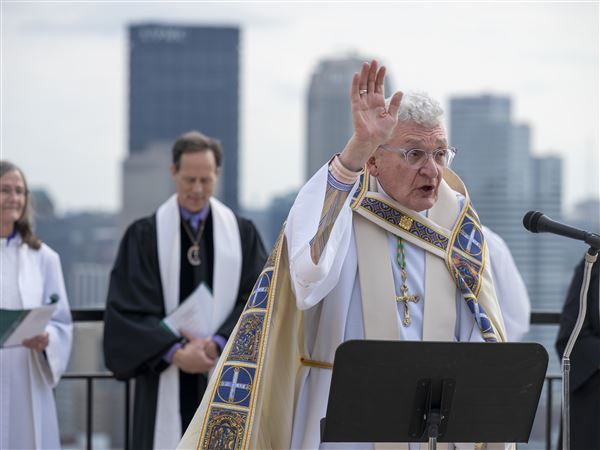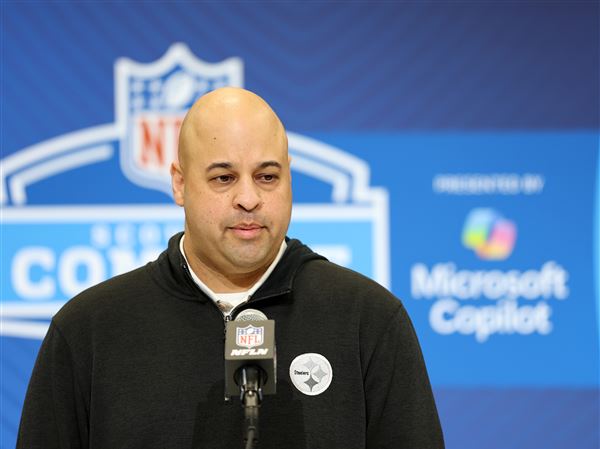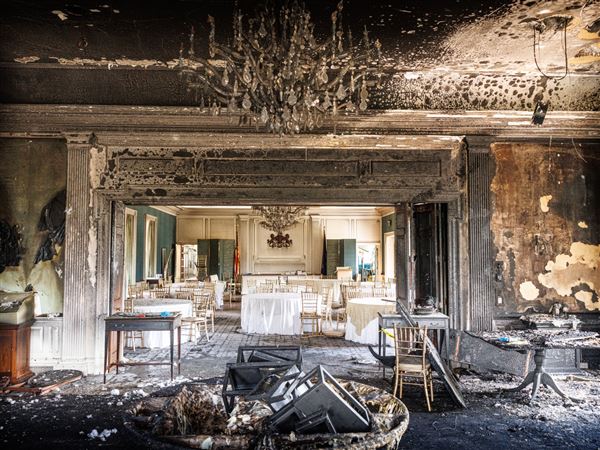"There are citizens and members of the media who are convinced that all of us in this room are ... criminal[s]. They will never change their mind. You could give them the key to your entire filing cabinet and they'll still think you're hiding something.
"But on the flip side, you have public officials who, when a citizen comes and they pull into the parking lot and they want the budget, what the local official hears is, you want to come into my living room and look at what?"
-- Terry Mutchler, executive director, Office of Open Records, at a presentation to the state House Appropriations Committee, Feb. 19
Until this year, Pennsylvania's open-records law had an abysmal reputation.
"It was widely considered the worst, there is no question," said Charles N. Davis, executive director of the National Freedom of Information Coalition.
But on Jan. 1, a revised Right-to-Know Law took effect. Eleven days later, the state's newly created, independent Office of Open Records began refereeing its first dispute between the public and a government agency.
Now, Mr. Davis said, as the one-year anniversary approaches, Pennsylvania's open-records law "easily" ranks in the top third across the nation -- what he called a "signal improvement."
Although the law and the office have won widespread praise, the first year of a new commitment to openness has not been trouble-free.
Low points include some rulings acknowledged by the office to be mistakes, tensions in the spring with Gov. Ed Rendell's administration, mid-year fears over budget cuts, concerns by some that the new process is bogging down access instead of speeding it up, and worries that if agencies want to dig in their heels and deny records, disputes will ultimately end up in court -- just like in the old days.
"I think the Right-to-Know Law has been a great success, although there are certainly issues we'd like to see addressed. No law is perfect, and the Right-to-Know Law is not perfect, either," said Melissa Bevan Melewsky, media law counsel for the Pennsylvania Newspaper Association.
Observers also consistently cite thorny issues that have arisen repeatedly without a definitive ruling on whether to release home addresses of public employees and records of agencies' internal deliberations before issuing decisions.
"There are many provisions in the new law that are problematic simply because they remain open to interpretation. It's going to be years before some of these provisions get worked out in the courts," said Kim de Bourbon, executive director of the Pennsylvania Freedom of Information Coalition. "Or until enough of a stink is raised that legislators get back into the law and do some amending."
While the old law put the onus on citizens to show that a record is public -- from Penn State football coach Joe Paterno's salary to 911 logs -- the new law presumes that almost all records are open unless the government proves otherwise.
The public has been quick to put the law and the open records office to the test. As of Monday, the office had logged 1,006 appeals filed by people who have been denied access to records, nearly 90 percent of them filed by private citizens.
Eighty-four decisions made by the open records office have been appealed to court, which Terry Mutchler, the office's executive director, notes is a low 8 percent of all appeals received. However, it constitutes 16 percent of the 522 decisions issued by the office. That percentage only rises when considering appeals of records granted by the office -- decisions likely to be contested by an agency, not a citizen.
No matter how you crunch the numbers, the appeals mechanism itself seems to be working properly.
The open records office's decisions are mostly viewed as even-handed, upholding the law instead of advocating for one side or the other. Ms. Mutchler said access to records has definitely improved.
Mr. Davis warns, though, that the letter of the law itself is not enough to ensure open government.
"You can write a beautiful law that is completely ignored. So a lot of it has to do with the application of the law. So time will tell. What they have there is a structure that can work. What they had before is a structure that absolutely did not work," Mr. Davis said.
At the vanguard of applying the law is Ms. Mutchler, a lawyer and former reporter for The Associated Press, who was appointed in April 2008 to a six-year term as the office's head.
With a $1.25 million budget, Ms. Mutchler leads a small staff in handling appeals by people denied government records.
In the past, anyone seeking to battle an agency would have no choice but to hire a lawyer, sue and engage in a potentially costly legal battle. Now, the first step is appealing to the taxpayer-funded open records office, whose lawyers interpret the Right-to-Know Law and issue binding opinions.
Ms. Mutchler has earned strong support from open-records advocates and politicians, including Gov. Rendell and Senate Majority Leader Dominic Pileggi, R-Delaware.
The governor backed her even in the face of a pointed, three-page letter she sent him in March complaining that his administration had stymied her mission in various ways. Ms. Mutchler said she and the governor had a private meeting and worked things out.
Ms. Mutchler also managed to stave off a budget cut of more than 35 percent -- a minor miracle considering the economy and budget debacle in Harrisburg this year -- which she said would have decimated an office that she sees fulfilling a crucial function.
"The reality is this new Right-to-Know Law really is the keystone to open and honest government in Pennsylvania," Ms. Mutchler said.
It is also a law that she acknowledges has its flaws. Ms. Mutchler is keenly aware of the criticisms. In some cases, she even echoes them.
For instance, even though the law presumes an openness of records, she has this to say: "Let's be clear, the deck is stacked against the citizen." Her office has six lawyers; the state Office of General Counsel -- which represents 32 executive and independent state agencies -- has roughly 500.
"We're outgunned, there's no question."
Ms. Mutchler recognizes that a change in law cannot necessarily alter a culture overnight.
"The bottom line is this law comes down to a philosophy. You can look at this law and say, 'I'm going to use it as a tool to open government,' or you can look at this law and say, 'I'm going to use it to deny a record.' It happens every single day."
The law does not mandate the filing of a formal request, but open-records advocates grouse that some agencies regularly require them.
"Under the old law -- which provided access to very little -- some agencies routinely handed over records to the public without a thought," Ms. de Bourbon said.
"Now that there is this big, complex law in place, with agencies bearing the burden of proof, some agencies have tightened up their access and insisted that request forms be filed and protocol followed because they don't want to be put in the position of not 'following' the law," Ms. de Bourbon said.
She also pointed out that agencies are tending automatically to deny records contained in a list of 30 exceptions under the law.
"Agencies have the discretion to release any records they want. But many agencies see that as a list of 'don'ts' instead of a list of 'don't have tos,' " Ms. de Bourbon said.
Some contend that instead of simply turning over records that are clearly public, some governmental bodies have used the law to slow down the release of records by making requesters wait the maximum five business days for a response and then invoking a 30-day extension.
"It can't be that an agency always needs five business days and 30 calendar days," Ms. Melewsky said. "When that happens, I think the agencies are ignoring both the letter and the intent of the law. The intent of the law is for agencies to facilitate access to public records."
There is also debate about the fact that the open records office cannot truly compel government to turn over records.
Its decisions, while considered binding, can be appealed to court. There are no procedures or standards governing the handling of open-records appeals in court. And the open records office appears before a judge to defend its decision only in Commonwealth Court -- which has 31 appeals before it -- not in county Common Pleas courts.
"If any agency wants to be a real pain about releasing a record, they can just go to court knowing that a requester doesn't have the time or resources to fight it," said Simon Campbell, 42, of Bucks County, who frequently appeals records denials for his group stopteacherstrikes.org.
Most requesters are representing themselves, he noted, and some may live hundreds of miles from the agency from which they requested information.
"Are you really going to be hiring a lawyer and taking time out of your life to go there?"
As the new law's wrinkles are worked out, advocates are on the lookout for legislation that might erode its power. Politicians have already introduced amendments that, if passed, would exclude volunteer fire companies and the Pennsylvania Interscholastic Athletic Association from the law.
"There are certainly bills [out] there. There are certainly more to come. I think anytime you reopen the law, you risk chipping away at the significant progress we've made," Ms. Melewsky said.
Ms. Mutchler is happy not to monkey with the law during its first year. Recognizing that strides still need to be made, she is satisfied that a "stunningly anti-democratic" open-records law has been remade, placing Pennsylvania at the cutting edge.
Ms. Mutchler sees greater things ahead. Pennsylvania is an emerging open-records leader among states. Her opinions have been sought by the U.S. Congress, the Ohio Supreme Court and lawmakers in Maryland. She thinks it's possible that, given time, the commonwealth might one day boast the best open-records law in the nation.
"It sounds a little heady to say that," she said, "but the reality is when I look at what Pennsylvania experienced being the worst or one of the two worst in the nation for government access laws, this is a seismic shift, and it has opened a lot of filing cabinets."
First Published: November 29, 2009, 10:00 a.m.
















